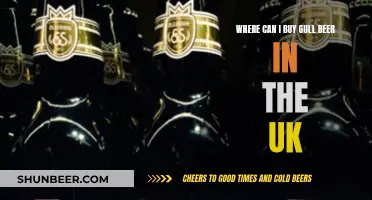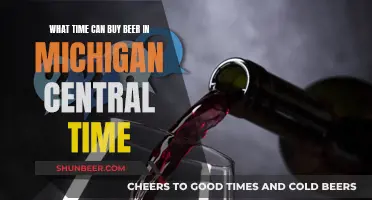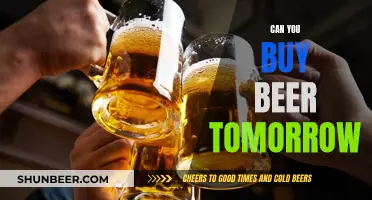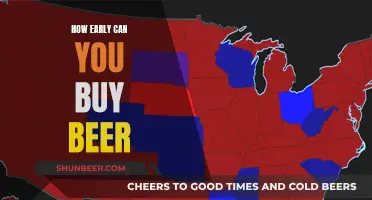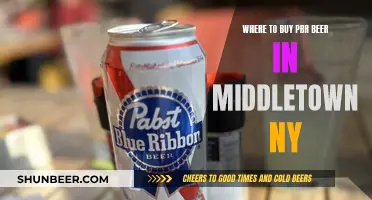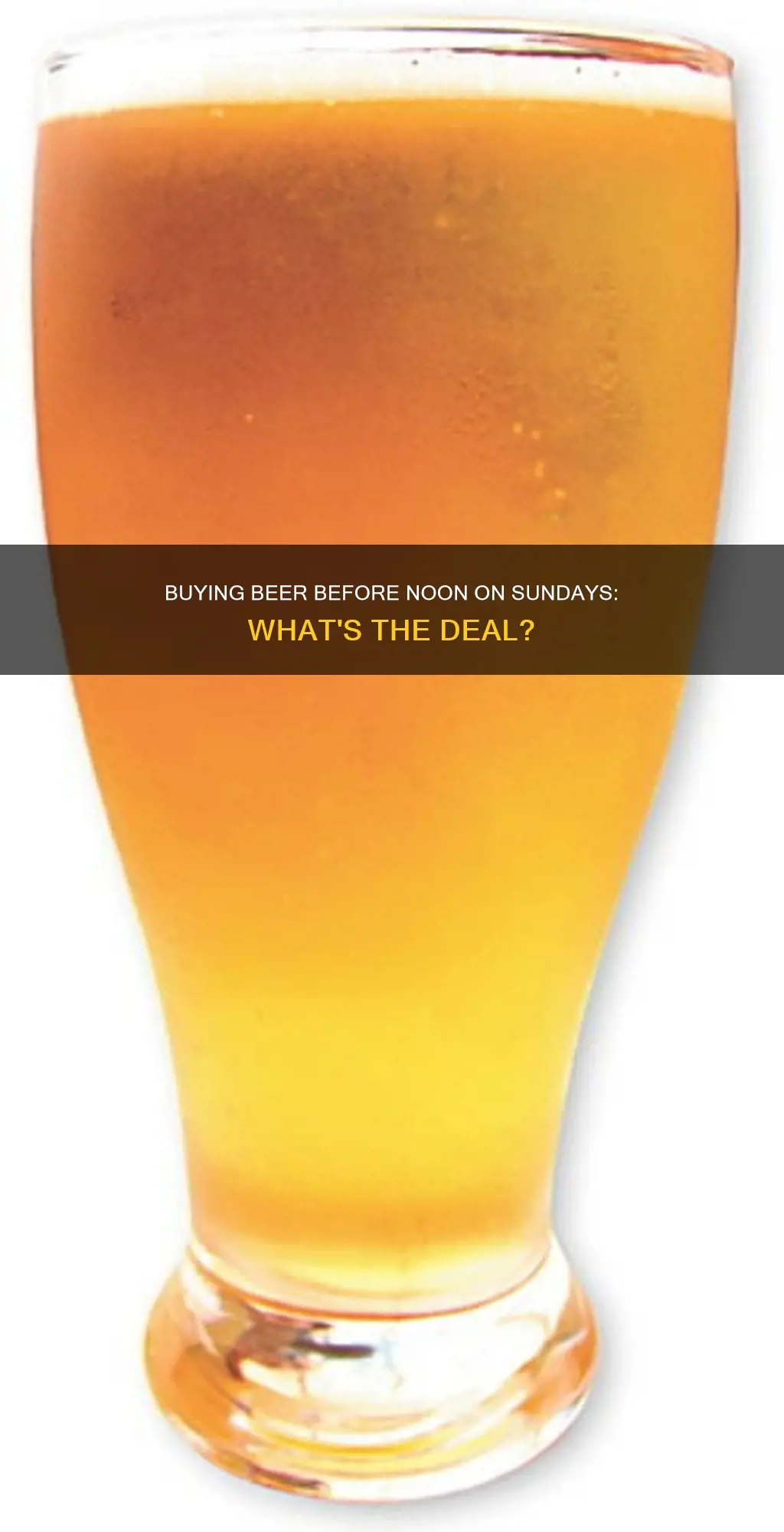
The ability to buy beer before noon on a Sunday varies by location. In some places, like Texas, beer and wine can be purchased from grocery and convenience stores starting at 10 a.m. on Sundays. In Michigan, alcohol can be purchased from 7 a.m. on Sundays, but only at stores and restaurants with the proper permits. In other places, like Georgia, no off-premise alcohol sales are allowed on Sundays. These laws, often referred to as blue laws, are historically rooted in religion but are now justified by public health and safety concerns.
| Characteristics | Values |
|---|---|
| Country | United States |
| State | Texas |
| Alcohol Type | Beer and Wine |
| Day | Sunday |
| Time | Before Noon |
| Purchase Location | Grocery and Convenience Stores |
| Purchase Time | 10 a.m. Onwards |
| Law | Blue Laws |
| Law Amendment | HB 1518 |
| Law Amendment Date | September 1, 2021 |
What You'll Learn

Texas alcohol laws
In Texas, it is illegal to sell liquor on Sundays, Thanksgiving, Christmas, and New Year's Day. If Christmas or New Year's Day falls on a Sunday, the sale of liquor is prohibited on the following Monday. Liquor stores are only allowed to operate from 10 am to 9 pm, Monday through Saturday.
However, Texans can buy beer and wine at grocery and convenience stores starting at 10 am on Sundays, thanks to a change in state law that went into effect on September 1, 2021. Before this change, consumers had to wait until noon on Sundays to purchase beer and wine. The new law only applies to beer and wine, and liquor stores must remain closed on Sundays.
During weekdays, grocery and convenience stores can sell beer and wine from 7 am until midnight, Monday through Friday, and from 7 am on Saturday until 1 am on Sunday. On Saturdays, beer and wine sales are allowed from 7 am until 1 am on Sunday.
There are some exceptions to the alcohol laws in Texas. For example, bars and restaurants inside hotels are allowed to serve alcoholic beverages to registered guests at any time of day, as long as they have the proper permits. Additionally, alcohol can be served at live events, such as sports venues, festivals, fairs, or concerts, from 10 am to noon on Sundays, with the proper permits.
Where to Buy Magnify Beer: Beyond the Brewery Walls
You may want to see also

Michigan alcohol laws
Michigan's alcohol laws can be confusing, with some conflicting information out there. Here is a detailed overview of the laws regarding buying beer or alcohol before noon on Sundays in Michigan:
Buying Alcohol Before Noon on Sundays:
The laws regarding alcohol sales on Sundays in Michigan have evolved over the years. Currently, the sale of alcohol is permitted from 7 a.m. to 2 a.m., Monday through Saturday, and from noon to 2 a.m. on Sundays. This applies to both on-premise and off-premise consumption.
However, there is an option for retailers to obtain a special license extension, allowing them to sell alcohol from 7 a.m. on Sundays as well. This change in the law has been welcomed by many businesses, resulting in increased sales and customer convenience.
County and Local Ordinances:
It's important to note that individual counties and local governments in Michigan can have their own regulations regarding alcohol sales on Sundays. Some counties may prohibit the sale of alcohol before noon on Sundays or even opt out of Sunday sales altogether. These ordinances are subject to change and vary across the state, so it's always a good idea to check the specific rules for your county or locality.
Historical Context:
The history behind these laws is complex and often rooted in religious traditions, aiming to protect the "Sabbath day." While the government cannot legally enforce bans on Sunday alcohol sales for religious reasons, public health and safety concerns, as well as curbing excessive alcohol consumption, are often cited as justifications.
Other Alcohol Regulations in Michigan:
Michigan has a comprehensive set of alcohol regulations. The state forbids the sale of alcohol to anyone under 21 and to intoxicated individuals. The state also has a monopoly on wholesale spirits sales and mandates minimum pricing for all alcohol sales.
Additionally, Michigan prohibits the sale of alcohol after 9 p.m. on December 24 and all day on December 25. On January 1, on-premise alcohol sales are permitted until 4 a.m.
Retailers and Permits:
Grocery stores, convenience stores, and gas stations (except in Wayne County) can sell beer and wine in Michigan if they have the appropriate permits. Gas stations with permits can also sell liquor.
Direct-to-Consumer Shipping:
Michigan allows direct-to-consumer shipping of wine only if the seller possesses a DTC permit.
Exploring France's Unique Beer-Buying Age Limit for 16-Year-Olds
You may want to see also

Indiana alcohol laws
Indiana's alcohol laws have been described as "'archaic and obsolete, at times contradictory, and often confusing". They are a legacy of Prohibition, and of the end of Prohibition, which allowed states to set their own rules.
Alcohol can be sold in Indiana between 7 a.m. and 3 a.m. throughout the week. However, alcohol sales at liquor, grocery, and convenience stores are limited from noon to 8 p.m. on Sundays.
Where can you buy alcohol in Indiana?
Indiana is not a dry state, and does not have any dry counties. However, the town of Shipshewana in LaGrange County does not sell alcohol due to the citizens' desire to keep the town dry.
You can buy alcohol in Indiana at:
- Bars and restaurants
- Package and liquor stores
- Breweries and taprooms
- Gas stations
- Grocery stores
Indiana's alcohol laws
Indiana has more than 50 types of permits for the sale of alcohol. Common permits include a two-way permit that allows for beer and wine, and a three-way permit that includes liquor. The state fee for a two-way permit is $750 and $1,000 for a three-way permit.
Open container laws
Indiana has no restrictions on carrying alcohol in public spaces. Patrons are allowed to carry an alcoholic beverage in its original container out of a bar or restaurant and consume it on the sidewalk. However, the bar or restaurant may not allow drinks to be carried out as part of its policy. People in motor vehicles are not permitted to have an open container unless they are paying for a ride in a taxi or rideshare, or in the living quarters of a recreational vehicle.
Happy hour
Indiana has a ban on happy hour. While bars and restaurants are allowed to offer drink specials, they are prohibited from selling alcohol at reduced prices during a certain period of the day.
Drinking age
The minimum drinking age in Indiana is 21. There are no exceptions to the minimum drinking age in Indiana, and individuals who provide alcohol or allow underage drinking can face jail time and fines.
Bass Beer: Where to Buy and Enjoy It
You may want to see also

Arizona alcohol laws
Arizona's alcohol laws have evolved over the years, with the state gradually relaxing its regulations. Here is a comprehensive overview of the alcohol laws in Arizona:
Availability and Timing of Alcohol Sales:
Arizona allows the sale of alcohol every day, including Sundays. Licensed establishments can sell alcoholic beverages between 6:00 a.m. and 2:00 a.m. daily. This timeframe applies to various types of businesses, such as grocery stores, liquor stores, bars, and restaurants. However, it's important to note that local ordinances or specific city regulations may impose additional restrictions on alcohol sales, especially on Sundays. Therefore, it is advisable to check the regulations of the specific locality for accurate information.
Bars and Restaurants:
Bars, restaurants, wineries, and breweries in Arizona must stop selling alcohol from 2:00 a.m. to 6:00 a.m. every day. Customers are allowed until 2:30 a.m. to finish their drinks, after which it becomes illegal for anyone other than employees to possess an open container. Some bars with a “series 6” license can serve alcohol until 2:00 a.m., while restaurants with a “series 12” license can also serve until 2:30 a.m. if they meet certain conditions, such as deriving at least 40% of their gross revenue from food sales.
Drinking Age and Minors:
The legal drinking age in Arizona is 21 years old, which aligns with the federal drinking age in the United States. It is illegal for individuals under the age of 21 to purchase, possess, or consume alcoholic beverages, except in specific circumstances like religious or medical reasons. Minors are allowed to enter bars and restaurants if accompanied by a parent, spouse, or legal guardian of legal drinking age, but they are prohibited from consuming alcohol.
Growlers and Open Container Laws:
Arizona allows the sale and possession of growlers, which are large glasses or bottles containing up to 64 ounces of beer. However, open container laws prohibit possessing or consuming open alcoholic beverages in motor vehicles, except in commercial vehicles or the living areas of motor homes.
DUI Laws:
Arizona has strict laws regarding driving under the influence of alcohol. The state imposes severe penalties for DUI convictions, including license suspension, jail time, fines, and the mandatory installation of ignition interlock devices. The legal limit for drivers under 21 is set at any trace of alcohol, while the limit for drivers over 21 is a blood alcohol concentration (BAC) of 0.08%.
To-Go Cocktails and Alcohol Delivery:
During the COVID-19 pandemic, Gov. Doug Ducey allowed cocktails to-go for the first time in 2020. Currently, bars, liquor stores, and restaurants with the proper licenses can sell to-go cocktails, but restaurants must also offer at least one takeout food item. Alcohol delivery is permitted within the standard alcohol sale hours of 6:00 a.m. to 2:00 a.m.
Licensing and ID Requirements:
Bartenders in Arizona must be at least 18 years old, while grocery clerks selling alcohol can be as young as 16. To purchase alcohol, individuals must present valid identification, such as an unexpired driver's license, a non-operating ID, a military ID, or a passport. Using a fake ID is a Class 3 misdemeanor and can result in jail time and the loss of driving privileges.
Where to Find Schmidt's Beer in Erie, PA?
You may want to see also

Alcohol laws in the UK
The UK has several laws in place to regulate the sale and consumption of alcohol. Firstly, it is illegal to sell alcohol to anyone under the age of 18, and those under 18 are prohibited from buying or consuming alcohol in public places. Both the seller and buyer can face fines and prosecution for breaking this law, and the licensed premise can be fined or shut down. To ensure compliance, licensed premises must carry out ID checks. Underage drinking in public can result in fines or arrest, and the police have the authority to confiscate alcohol from minors.
In the UK, only licensed venues such as pubs, clubs, hotels, restaurants, and some shops like supermarkets and off-licenses are permitted to sell alcohol. These licenses are granted and monitored by local authorities, typically the council, and licensed premises must abide by the specified hours during which they are allowed to sell alcohol. Additionally, licensed premises must have a designated person responsible for any issues that may arise.
Drinking alcohol in public places is illegal in many parts of the UK, and local councils have the power to implement measures to restrict drinking in specific areas to maintain public order. In England and Wales, councils utilize 'Public Space Protection Orders' (PSPO), while Scotland and Northern Ireland grant individual councils the authority to enforce their own rules. Drinking in prohibited areas can lead to fines or arrest, and police officers are authorized to confiscate alcohol.
The UK also has laws prohibiting drinking on public transport, including services in London, Scotland, and Northern Ireland. Being drunk in public or on a train is an offense and can result in fines or arrest. Additionally, drinking banning orders (DBO) can be issued in England and Wales for alcohol-related offenses, restricting individuals from drinking or possessing alcohol in public for up to two years.
Buying Beer in Florida: Early Morning Restrictions
You may want to see also
Frequently asked questions
Yes, you can buy beer at grocery stores or other retailers starting at 10 a.m. on Sundays.
Yes, you can buy alcohol in Michigan on Sundays starting at 7 a.m. in stores and restaurants that are permitted to sell alcohol.
Yes, some states such as Georgia and Connecticut have prohibited the sale of beer and other alcoholic beverages on Sundays.
Yes, some counties in the United States are "'dry'," meaning they prohibit the sale of alcoholic beverages entirely. For example, out of Arkansas's 75 counties, 39 are dry.
The restrictions on Sunday alcohol sales are often rooted in religious traditions, particularly in Christian churches following the first-day Sabbatarian tradition. However, the stated reasons for these laws often centre around promoting public health and safety and curbing excessive alcohol consumption.


